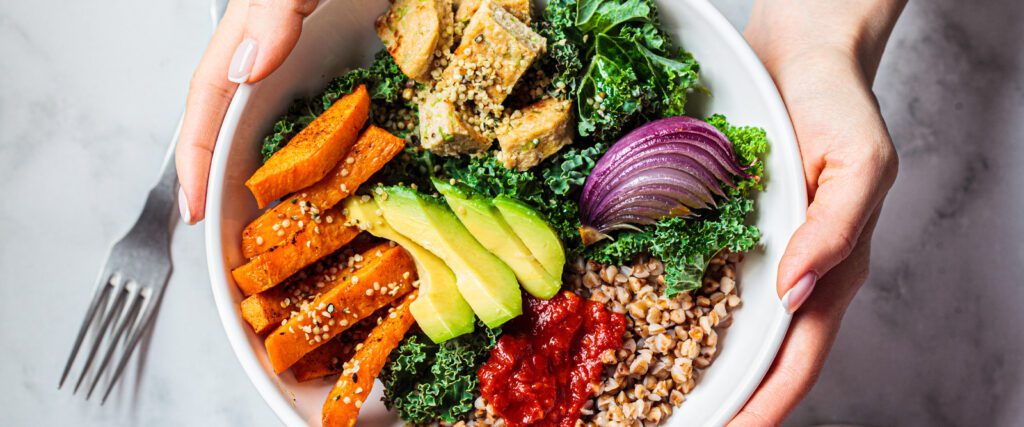A nutritionist explains the advantages and disadvantages of a vegan diet and communicates what should take into account for those who want to become vegan.

With studies that show that the food can increase too much red meat its risk of health diseases, including heart disease and cancer, have become more and more popular on a plant -based diet. According to a study, the percentage of the Americans, who pursued a plant -rich nutritional pattern, has more than doubled from 12% to almost 26% between 2012 and 2022. While the limitation of processed food and the inclusion of more fruit and vegetables has proven their health in their diet, what does it mean to become vegan? And is vegan healthier?
“Being vegan means that you not only cut out all meat, but also all products of animals such as dairy products and eggs,” says Alexa Bickhart, an advanced II dietary at Newyork-Presbyterian/Weill Cornell Medical Center and New York Presbyterian’s Ambulatory Care Network. “Although it has many potential health benefits for a vegan diet, it is not for everyone. It requires thoughts and planning, and you have to be more intended to get enough certain nutrients. “
Health issues Alexa spoke to find out how he passes into a vegan diet and at the same time prioritized general health and well -being.

What is a vegan diet?
A vegan diet excludes animal products, including meat, fish, seafood, poultry, eggs and dairy products. Ideally, it would emphasize whole foods such as fruits, vegetables, whole grains, nuts and seeds and legumes. However, every diet that avoids all animal products is considered a vegan diet.
What are the advantages of vegans?
Some people may be vegan for health benefits. There is indications that a low-fat vegan diet can promote weight loss and other health benefits, including heart health, insulin sensitivity and the treatment of type 2 diabetes.
According to the American Heart Association, the food reduces less meat the risk of heart disease, stroke, high blood pressure, high cholesterol, type -2 diabetes and many types of cancer.
Others can become vegan for the environmental advantages, since vegetable nutrition is better off for the environment than for animal diets. Of course, others can become vegan because of their personal preferences, values or religion.
Is the food of vegans healthier than a diet that encompasses animal products?
While there are certainly health benefits associated with the introduction of a rounded vegan diet, it is not necessarily “healthier” and not right for everyone.
Following a vegan diet can be more difficult for some than for others because they restrict food (animal products). Due to these restrictions, there is also a risk of nutrient deficiencies if they are not implemented properly.
For example, someone with digestive problems that do not tolerate fiber -rich diet, or someone who does not like things like beans, lentils or soy, may be difficult to get the nutrients they need after a vegan diet.
It can also limit the available food options in certain restaurants or social assemblies with food that can be a problem or barrier for some.
There is also the possibility that dietary restrictions associated with a vegan diet can promote or increase eating patterns for some people, which is an important consideration.
How can vegans make sure that they get enough nutrients?
I would recommend emphasizing full value food such as fruits, vegetables, whole grains and legumes as well as a moderate amount of heart -healthy unsaturated fats such as nuts, seeds, avocados and vegetable oils such as olive oil or avocado oil.
Some great sources of protein on a plant -based protein sources include beans, lentils, peas, nuts, seeds, seitan (a meat alternative made of gluten), soybasis products such as soy milk, tofu, tempeh and Edamame or vegetable protein powder.
It is also important to eat a variety of food. In other words, try not to eat the same food every day. Different foods provide different nutrients. It is therefore advantageous to change them and maximize the amount of nutrients in their diet.
Self -monitoring can be helpful for some, but cannot be appropriate for others. If someone who follows a vegan diet unintentionally decreases, this is a sign that they may have to increase calorie intake. In some cases, however, the weight of self -monitoring may not be appropriate if it causes stress or fear or if it contributes to the negative body image.
I always recommend advice with a registered nutritionist to create sustainable, rounded eating patterns.
What nutrients do vegans have to make sure that they go into their diet?
Those who follow a vegan diet should ensure that they intentionally receive certain important nutrients. This includes:
- Vitamin B12 (found in paved non -milk milk and fortified nutrition yeast)
- Vitamin D (in some fungi, fortified non-milk milk and enriched orange juice; sunlight is also important)
- Omega-3 fatty acids (found as alpha-linolenic acid in chia seeds, flat seeds, walnuts and hemp seeds)
- Iron (found in black, lima or navy beans, chickpeas, lentils, iron-fortified grain and oatmeal; consume with vitamin C to improve absorption)
- Calcium (found in kale, Bok Choy, fastened non -milk milk, fortified tofu, white beans in canned food, dried beans and peas, spinach, oranges and sweet potatoes with the skin)
- Iodine (found in iodized salt and seatang)
- Zinc (found in roasted cashew nuts, pearl barley, oatmeal, almonds and kidney beans)
Since vitamin B12 naturally occurs in animal products such as meat, fish, eggs and dairy products, the people who follow a vegan diet have a high risk of deficiency. You should talk to your doctor or a registered nutritionist about taking a vitamin B12 supplement.
I would also suggest to see a doctor who can check your vitamin D. If you are poor, you can help you determine which dose supplement you need. Additions should be recommended on a case -by -case basis under the supervision of a doctor or a registered nutritionist.
Is it unhealthy to eat dairy products?
If someone is allergic or intolerant against dairy products, I would not say that dairy products are bad for them. Dairy products are a good source of calcium and protein and offer many people a lot of fun.
I would consider the saturated fat in fat milk products, especially if you are careful with your heart health. On request, there are many low -fat or fat -free dairy products to choose from.
It is okay for someone to choose not to consume dairy products as long as he gets calcium and protein from other sources.
What are other ways to reduce the consumption of the animal product?
A vegetarian diet excludes meat, but can include eggs and dairy products. A pescavarian diet excludes red meat and poultry, but includes fish (and can also include eggs and dairy products). A “flexitarian” diet can emphasize plant food and at the same time enable flexibility to consume some animal products as desired.
When choosing an eating pattern, sustainability and personal preference depend on. I sometimes see that people are tuned into the decision, which “diet” they should follow if they could benefit more to concentrate on smaller, more realistic changes that they can do. For example, someone who normally eats meat every day could consider implementing a “meatless Monday” every week, on which they focus on vegetable meals.



